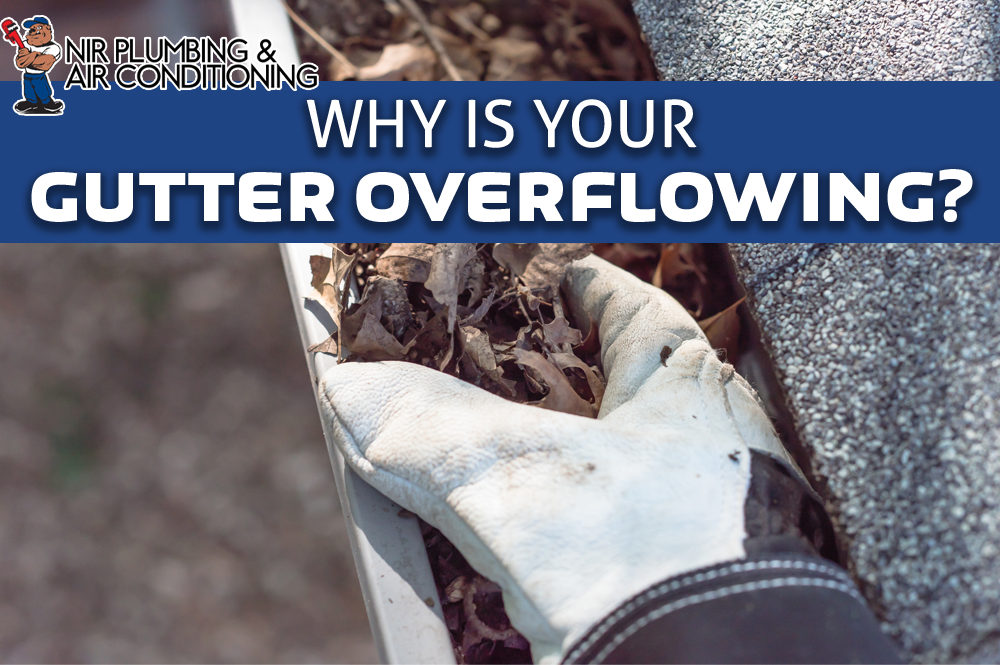[vc_row][vc_column width=”1/1″][vc_column_text] Overview: While the most common cause of an overflowing gutter is debris, there’s much that goes with it. Let’s help you out! [/vc_column_text][vc_column_text]
At first glance, water flowing outside the downspout may not look like a concern; however, you might be in trouble.
While the purpose of the gutter is to swallow water, moving it away from the house’s foundation, you should know that gutters overflow for various reasons.
Gutters work magically by dissolving water inside, keeping the foundations and walls of your house safe – there’s so much a gutter does for you to save your expenses; you owe them some appreciation, too, right?
So if you see the gutter overflowing with water consistently, it’s time to diagnose the problem and propose a solution – after all, they’re in place for a reason. Although it may seem like a tiny part of your whole house, don’t overlook the damage if you’re neglecting proper drainage.[/vc_column_text][vc_column_text]
SO, WHY IS MY GUTTER OVERFLOWING?
[/vc_column_text][vc_column_text]Almost 90 percent of gutter overflow is caused by debris, leaves, roofing granules, and other concrete material that can cause a net blockage
To cope with this issue, install mesh screens over the gutter to prevent leaves, concretes, or other debris from falling into them. Keeping a check to clean out your gutters regularly will avoid damage in the future.
Try to clean your gutters at least three times a year – or if you have a garden or trees nearby, you’ll need to filter it out frequently.
When the downspout is clogged, the water doesn’t drain effectively, hence filling up the water to the top. If you’re a practitioner or a DIY enthusiast, it may appear to you as a leak because of the drips – and we get it. This is why we always recommend seeking help of a professional as they will always identify the problem in the first instance and offer a probable solution.
In case of debris or leaves cause the blockage, you may use a leaf blower to suck the junk out of the gutter – or the traditional old-school method of cleaning it out by hand (don’t forget to wear double gloves).
>> Related Article: The Best Way to Clean Gutters[/vc_column_text][vc_column_text]
Incorrectly Positioned:
[/vc_column_text][vc_column_text]
If the gutters have an incorrect pitch, you’ll find water flowing everywhere except the downspout. Now, this is a grave situation when you’re least aware of the cause.
Gutters have a minor slope so if there’s an adequately fitted pitch, the water will be directed to flow towards the downspout. It’s the same slope as your shower floor or sinks, where the water paves its way towards the drain on its own.
>> Related Article: 5 Tips for Gutter Placement
So we know that incorrectly pitched gutters may cause water to overflow the sides instead of the right spot, but what causes the pitched gutters? Simply two reasons: either a poorly installed gutter or an aging system.[/vc_column_text][vc_column_text]
Gutters Hanging Too Low:
[/vc_column_text][vc_column_text]Another probable reason can be the gutters hanging too low, leaving no space between your house and the gutter system – or it maybe too small to handle the water coming from the roof. It’s a one-time investment, so make sure that you’re investing in the right and big solution to avoid future destruction.[/vc_column_text][vc_column_text]
Loose Gutter Overflow:
[/vc_column_text][vc_column_text]
Depending on how loose the gutter is, the water will overflow in multiple directions – if it’s slightly open, the water will go behind the gutter, flowing down the wall – and if the gutter is to fall off of the home, (we’re sorry to say) the water will pour out like a bucket.
Although there are possibly several ways to prevent gutter overflowing, it’s totally normal. During heavy rainfall, the gutter may overflow (a) due to water pressure or (b) the water dragging the mess and debris around to the gutter, causing the blockage. Either way, pay a minor visit to the gutter to keep an eye on how things are working – after all, prevention is always better than the cure.[/vc_column_text][vc_column_text]
How to Prevent Overflowing Gutters?
[/vc_column_text][vc_column_text]You’ve probably already picked up on this, but maintenance is the key to keeping your gutters working healthy. Cleaning it twice a year will keep your house happy – ideally late autumn and early spring. Keep the surrounding gutter area clean. Clean trees and greenery off and do not throw the dry leaves in the gutter – or you’ve invited the trouble.[/vc_column_text][vc_column_text]
IN SUMMARY:
[/vc_column_text][vc_column_text]
The bad news is that your gutter has overflowed, but the good news is that we’ve diagnosed the issue in the early stages for a less costly (and pretty convenient) fix compared to the damage that follows after things are unchecked for ages.
And you never know when the gutters call for drainage experts – precisely when they buckle, overflow, or are rusty from the sides. And in such a situation, know that it’s high time to replace the old gutter with new. Reach out to us to learn more about how your home can benefit from better guttering.[/vc_column_text][/vc_column][/vc_row]


